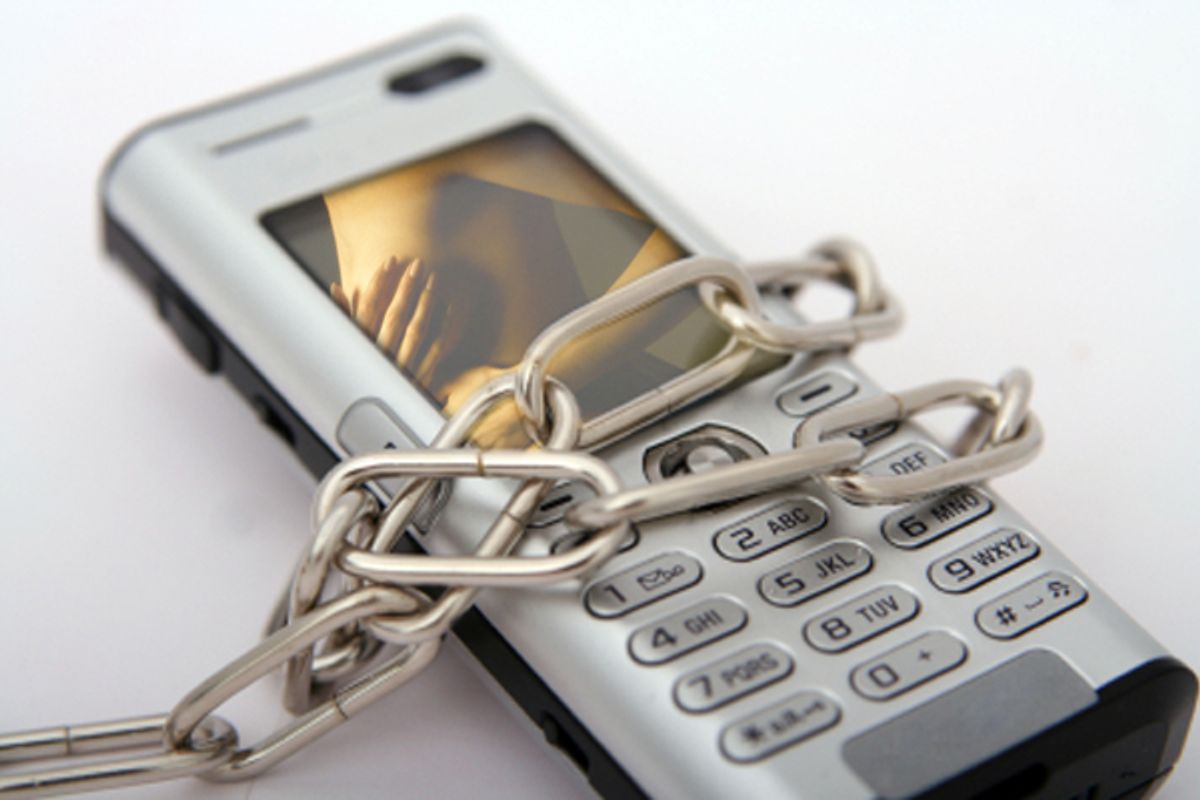It isn't just Scarlett Johansson and other recently exposed celebrities and politicians who should be concerned about protecting their naughty cellphone snapshots. The FBI may be investigating hacks of roughly 50 celebrities, but many more ordinary folks have had their naked photos hacked and stolen within the past year. So, how do you protect yourself?
Well, as purity-pledgers like to say: The only 100 percent effective form of protection is abstinence. But no amount of horrifying STD slide shows or pseudo-scientific preaching about oxytocin will stop people from having premarital sex -- and the same is true of porny self-portraits. Quite frankly, I'm sick of the finger wagging at starlets for being so stupid as to take nude photos of themselves -- it's a little victim-blame-y, no? Dirty texts and emails are simply part of how we have sex now, celebrities and non-celebrities alike, and thankfully there are safe alternatives to total sextual chastity.
Before we get to the technical nerdy stuff, a photographic pointer: Keep your face and any identifying tattoos or birthmarks out of the shot. Should someone hack your Facebook account, find those naked photos you sent your boyfriend and then post them on your profile for all of your friends, family and colleagues to see, you can at least claim with some plausibility that it isn't a photo of you.
Now for the unsexy talk of good passwords, which might have prevented at least some Hollywood Leaks attacks, based on the group's claims. A good place to start is making sure that yours aren't among the most popular ones. Don't choose words that are in the dictionary or use the same password for multiple accounts. For a great primer on how to make a strong password, check out this video, which explains how you can easily remember a seemingly random and nonsensical jumble of characters.
For starters, you'll want to apply these beefed-up passwords to your phone, so that if it's stolen, the thief will be locked out (and, again, dont use one of the most popular codes). "On most smartphones now, the phone will automatically erase information after a certain number of failed attempts to unlock," Frederick Lane, a cyber security and computer forensics expert, tells me. He also points out that there are apps, like Photo Safe, that protect pictures with a password and sometimes even encrypt them. "Again, if the wrong password is entered multiple times, the content is wiped out," he says.
Then there's all manner of virtual accounts -- from email to Twitter to Facebook. Not only should you apply strong passwords, but you absolutely must have a strong series of security questions. This likely would have prevented the recent hack of Rapper Kreayshawn's Twitter account and the release of her topless shots. There's also the case of a California man who stole X-rated personal photos by scouring women's Facebook profiles for their email addresses and the basic information required by their email provider's security questions. Also, you might recall that this is how a hacker got access to Sarah Palin's Gmail account in 2008. Make the questions and answers so difficult that even your mom wouldn't be able to answer them (not that she'll be trying to snoop on your amateur porn, I hope). If you've ever shared dirty photos through email, all a hacker has to do is search through your sent mail folder for messages with photo attachments. As for your computer: Not only should you password protect that mofo at logon, but Lane also suggests encrypting and applying passwords to specific directories.
The next concern is malware. "Hackers have demonstrated in the past that it is possible for someone to access your smartphone's content remotely, by luring smartphone users to corrupted websites and executing malicious code," says Lane. "There are also some reports that malware producers are trying to develop apps to either send copies of photos to remote locations as they're taken, or to give hackers access to all of a phone's content. However, it's unclear whether those apps actually exist." The threat is even greater on computers: "The heightened risk for illegal intrusion into PCs stems from the fact that the architecture and software of PCs is much more well-known than phones, and the myriad programs and operating systems create numerous vulnerabilities," he explains. "It is amazing how frequently people visit sketchy websites [and] download files their friends supposedly sent them." (Last year, I wrote about a hacker who used malware to access dirty photos and videos on women's computers and then blackmailed them into filming and sending more.) So be careful about what websites you visit and what programs you install, and get "both firewall and anti-virus protection," he says.
Of course, most important is whom you choose to share your private photos with in the first place. If they don't take the same security precautions -- or if they just might turn out to be the sort of jerk that would post them on an ex-girlfriend porn website once you break up -- then your ironclad passwords and malware won't mean much; and, yes, it's true that the only fail-proof protection is to not take nudie pics at all. Ultimately, after considering the risks and the many ways to reduce them, it comes down to a personal decision of which is greater: The threat to your privacy or the threat to your sex life.



Shares